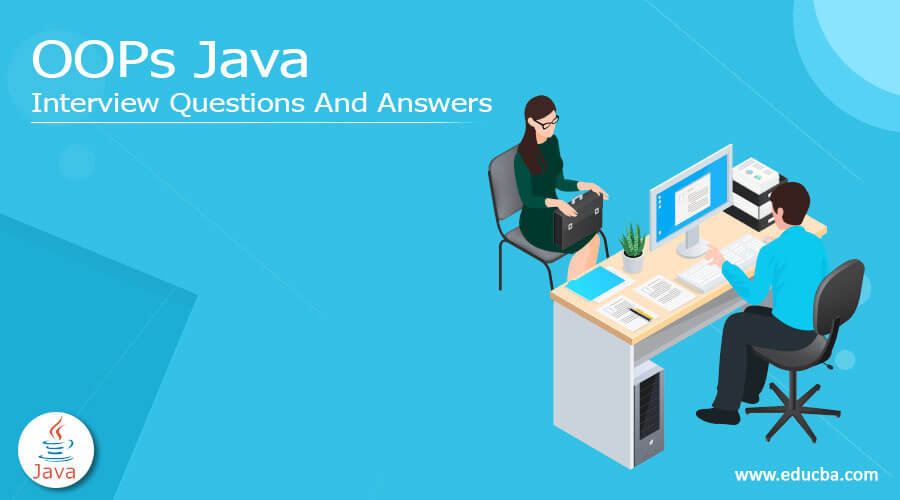Updated July 6, 2023
Introduction to OOPs Java Interview Questions And Answers
Oops, popularly known as Object-Oriented Programming techniques, is the programming paradigm that revolves around the concept of objects. In an OOP language such as Java, everything is an object which contains data, fields, and attributes, and we code them in the form of procedures, also known as methods. It also comprises class-based parameters which provide meaning to instances and determinants of their type. Oops, it revolves around the basic concepts of Abstraction, Polymorphism, Inheritance, Encapsulation, Objects, classes, and interfaces. This post has compiled a list of the most commonly asked and important OOPs Java interview questions and answers.
Now, if you are looking for a job related to OOPs Java, you must prepare for the 2023 OOPs Java Interview Questions. Every interview is indeed different as per the different job profiles, but still, to clear the interview, you need to have a good and clear knowledge of OOPs Java. Here, we have prepared the important OOPs Java Interview Questions and Answers, which will help you get success in your interview.
Below are the 8 important 2023 OOPs Java interview questions and answers that are frequently asked in an interview.
These questions are divided into parts as follows:
OOPs Java Interview Basic Questions
This part covers basic Interview Questions and Answers.
1. What are the different OOPs concepts?
Answer:
Different OOPs concepts are as follows:
- Polymorphism
- Abstraction
- Inheritance
- Aggregation
- Encapsulation
- Association
- Composition
2. What is polymorphism? Can we override a static method and a private method in Java?
Answer:
This is the most common OOPs Java Interview Question asked in an interview. The ability to identify a function during its runtime phase is called Polymorphism. In most object-oriented programming languages, such as C++ and Java, there are two types of polymorphisms, compile-time polymorphism (overloading) and runtime polymorphism (overriding).
Method overloading: The ability of a method to have the same method names but different parameter numbers or types is called method overloading.
Method overriding: It occurs when the class method of a child class consists of the same name and the method signature as that of the parent class. When you override methods, the JVM identifies the proper method to call at its program’s run time and not at the compile time.
No, overriding a static method in Java is impossible as the object does not bind it. On the other hand, Static methods are class-dependent and are resolved at the compile time using the reference variable type. Declaring the same method inside a subclass will result in method hiding.
No, it is impossible to override a private method in Java. Subclasses cannot override private methods because they are accessible and visible only inside the class in which they are declared. The inner class can access and override the variables.
3. What are some of the important Java 8 features?
Answer:
Some of the important features introduced in Java 8 are:
- forEach() method in an iterable interface
- Lambda expressions and functional interfaces
- Static and default methods in interfaces
- Java time API
- Stream API for bulk data operations on collections
- Concurrency API improvements
- Collection API improvements
- Java IO improvements
- Core API improvements
4. What is the difference between State and Strategy Patterns? What problem is solved by the Strategy pattern?
Answer:
The state and strategy patterns share the same structure or class diagram; however, their intent is completely different. State patterns work on specific tasks depending on the states, while the strategy works on switching the algorithm without changing the code. For example, a method, collections.sort() sorts the object list. You can compare various objects without changing the sort method because all the objects use a different comparison strategy.
OOPs Java Interview Advanced Questions
Let us now have a look at the advanced Interview Questions.
5. What are SOLID’s 5 design principles for an object-oriented approach?
Answer:
In the book Clean Code, written by Uncle Bob, each character in SOLID stands for one design principle:
- S – Single Responsibility Principle
- O – Open-closed design principle
- L – Liskov substitution principle
- I – Interface segregation principle
- D – Dependency inversion principle
6. Upon which OOP concept the Decorator design pattern is based?
Answer:
The decorator pattern takes advantage of the OOP feature of Composition to provide new features without modifying the original class. The component is associated with the Decorator.
7. What is the difference between Association, Dependency, Composition, and Aggregation in OOP?
Answer:
In the case of an association, one class has a member variable or an attribute of the other class type. In the case of dependency, a method involves an argument of the class type or the local variable of other class types.
There are two forms of associations, aggregation and composition. Aggregation is the loose form of association where the related object survives individually, whereas, in the case of composition, the object cannot survive individually.
8. What is ThreadLocal? Do we prefer the synchronized block or the synchronized method?
Answer:
The threads of an object share the variables unsafely.
Recommended Articles
We hope that this EDUCBA information on “OOPs Java Interview Questions And Answers” was beneficial to you. You can view EDUCBA’s recommended articles for more information.

